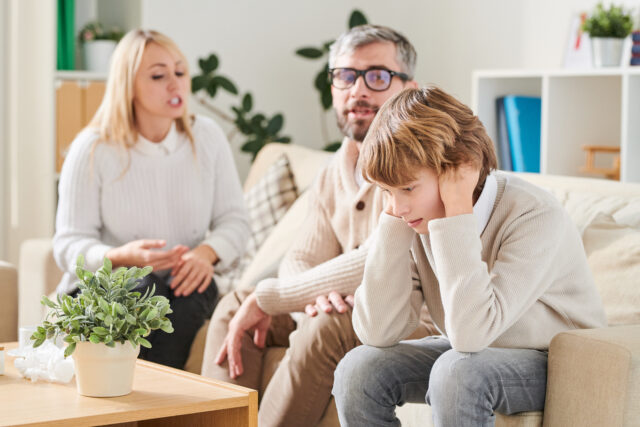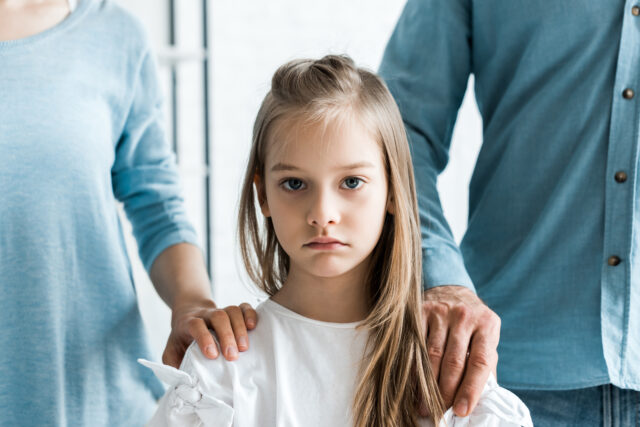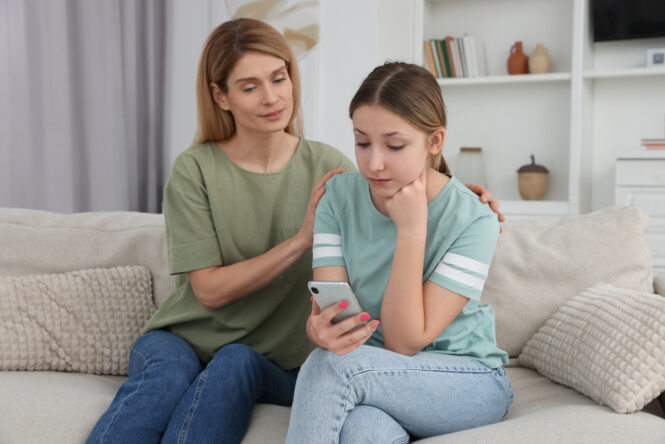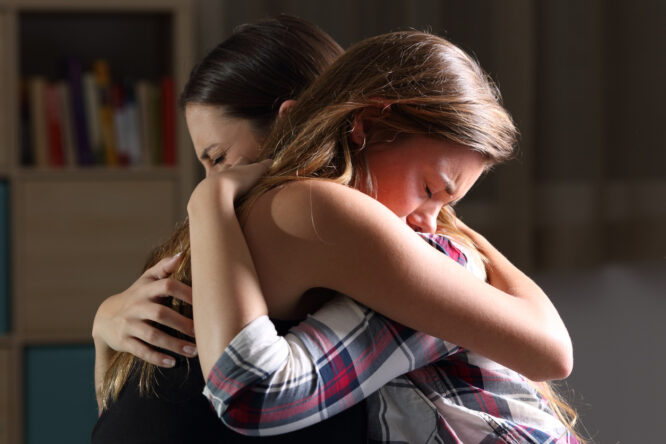When kids act out, it’s easy to get swept into frustration or react on autopilot. Every parent has been there.

However, the way you respond in those tough moments can either build connection or quietly chip away at it. You don’t have to be perfectly calm every time or have all the right words ready. What matters most is choosing language that corrects behaviour while keeping your relationship strong. The goal isn’t to raise a perfectly behaved child; it’s to raise a child who knows how to handle mistakes, regulate emotions, and still feel loved even when they’re struggling. Here are some effective things you can say to a misbehaving child to guide them without crushing their spirit.
1. “I see you’re upset. Let’s talk about it.”

Misbehaviour often masks bigger emotions like sadness, fear, or frustration. Leading with this phrase shows your child you’re willing to look deeper than the bad behaviour on the surface. You’re offering connection when they expect criticism, which can be incredibly disarming in a good way.
Even if they’re not ready to talk immediately, this line plants a seed. It tells them that you’re someone they can eventually come to with the real, messy stuff, and that’s the kind of trust that keeps the relationship strong over time.
2. “Your feelings are okay, but your actions need to change.”

Kids need help separating emotions from behaviours. When you say this, you’re validating that their emotional world matters without giving a free pass for hurtful actions. It’s a crucial distinction that builds emotional intelligence over time.
This phrase teaches that it’s safe to feel angry, disappointed, or sad, but what matters is how you handle those emotions. It helps children learn self-control without feeling shamed for having big feelings.
3. “You’re allowed to be mad. You’re not allowed to be hurtful.”

Big emotions like anger often overwhelm young kids, and they lash out because they don’t have the skills to express themselves yet. This simple statement gives clear boundaries without invalidating the emotion itself. It lets them know you’re not scared of their anger, and you’re not going to punish them for feeling. You’re simply going to hold the line on how anger gets expressed safely and respectfully.
4. “Let’s hit pause and try again.”

Sometimes misbehaviour snowballs because everyone gets stuck in the heat of the moment. Offering a “pause” gives both you and your child permission to regroup without escalating further. It’s a soft reset that signals grace and hope rather than judgement.
In the long run, kids who learn they can always “try again” without being labelled as bad become more willing to repair mistakes and less likely to double down in shame or defensiveness.
5. “What do you think needs to happen next?”

Instead of punishing automatically, asking this question invites your child into problem-solving mode. It teaches responsibility without stripping away their agency, and it encourages thinking through consequences rather than just fearing punishment. It might surprise you how fair and insightful kids can be when given the chance. Plus, it helps them internalise the process of reflecting, repairing, and making better choices going forward.
6. “I’m here to help you calm down, not to fight with you.”

When emotions are intense, kids often feel isolated and defensive. Reminding them that you’re there to help, not to attack, can defuse a lot of tension immediately. You’re aligning yourself as an ally, not an opponent. Sometimes that simple change—from feeling attacked to feeling supported—is enough to bring a spiralling situation back into a manageable place where real conversation can happen.
7. “You’re having a hard time. That’s different from being a bad kid.”

In tough moments, kids internalise messages fast, especially negative ones. Misbehaving doesn’t mean they’re bad, but if they start believing that story, it’s much harder to change the behaviour. Separating who they are from what they did helps preserve their self-esteem, making it easier for them to bounce back, own their mistakes, and keep growing rather than shutting down in shame.
8. “Let’s take a break and breathe together.”

Sometimes a child’s nervous system needs a reset before their brain can even process a logical conversation. Offering a breathing break, and doing it with them, models emotional regulation rather than just demanding it. It also reinforces that calming down isn’t a punishment; it’s a skill. Practising together during tough moments makes it far more likely they’ll eventually learn how to regulate themselves independently.
9. “I believe you can fix this.”

Believing in your child’s ability to repair a mistake is powerful. When they mess up, what they often fear most is that they’ve wrecked everything permanently. This statement reassures them that redemption is always possible. It keeps the focus on growth and effort, not on shame or failure. Kids who believe they can fix their mistakes are far more resilient and more willing to take responsibility in the future.
10. “It’s okay to be frustrated. It’s not okay to be mean.”

Big emotions are real, and so are behavioural limits. This phrase lets you validate the feeling without letting the unacceptable behaviour slide. It’s the balance between empathy and structure that kids desperately need. By consistently reinforcing this message, you help your child develop the critical skill of separating their inner experiences from how they treat other people—a skill that will serve them for life.
11. “Let’s talk about what went wrong, and what we can do differently.”

Focusing only on blame keeps kids stuck in defensiveness. Including them in a conversation about what they could do differently next time moves them toward growth and learning instead of punishment and resentment. Doing so also builds trust—you’re treating them like a capable partner in the learning process, not just an unruly problem to be fixed.
12. “You are still loved. That hasn’t changed.”

Even when kids act out, their deepest need is to know they are still loved and secure. Saying this out loud during difficult moments is more powerful than you might think. It anchors them emotionally when their own behaviour feels scary or confusing. Knowing that love isn’t withdrawn when they struggle gives kids a solid foundation for real emotional growth, not just temporary behaviour changes driven by fear of rejection.
13. “Your choices have consequences. Let’s figure this out together.”

Consequences should feel like learning experiences, not random punishments. Framing it as something you’ll figure out together makes the conversation less adversarial and more collaborative. It also teaches kids that accountability doesn’t have to be scary or harsh. It can be honest, kind, and aimed at real growth instead of just getting even for bad behaviour.
14. “Right now isn’t forever.”

Big emotions and bad behaviour can make a moment feel huge and permanent for both kids and parents. Reminding your child (and yourself) that this rough patch is just a moment helps everyone breathe a little easier. It gives them hope that change is possible, that mistakes can be repaired, and that one bad day doesn’t define them. That’s an invaluable mindset for building lasting resilience.
15. “I’m proud of you for trying again.”

Celebrating effort, not just outcomes, teaches kids that trying, especially after failure, is what really matters. It reinforces that growth is a journey, not a single moment of getting it “right” or “wrong.” Encouraging the willingness to try again plants seeds of perseverance, confidence, and emotional strength—exactly the traits you want to see growing in your child over time.




